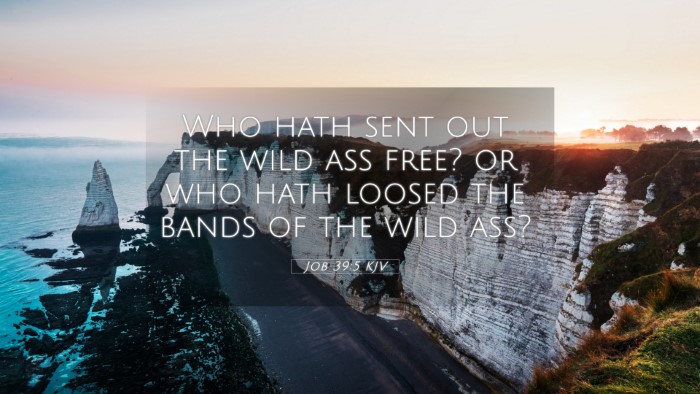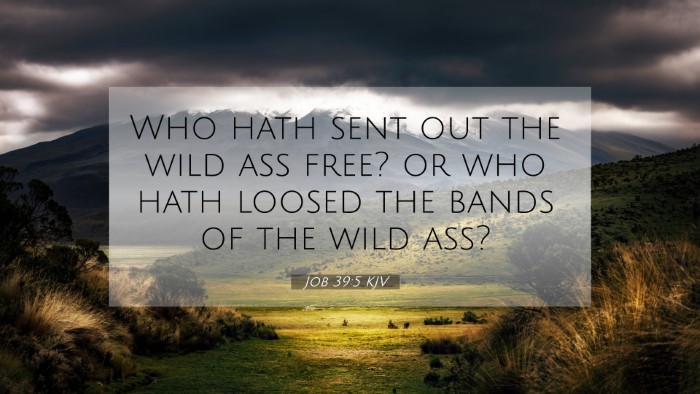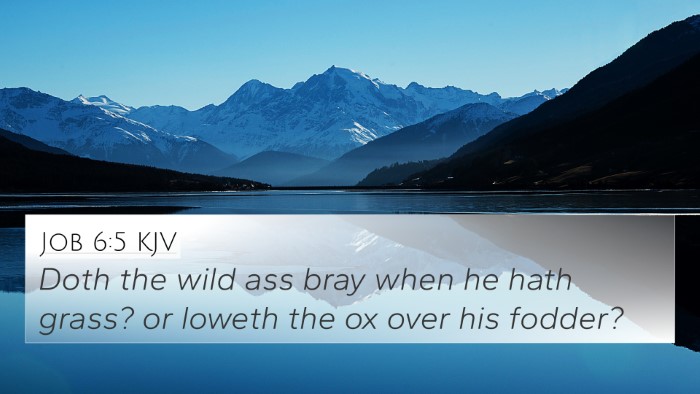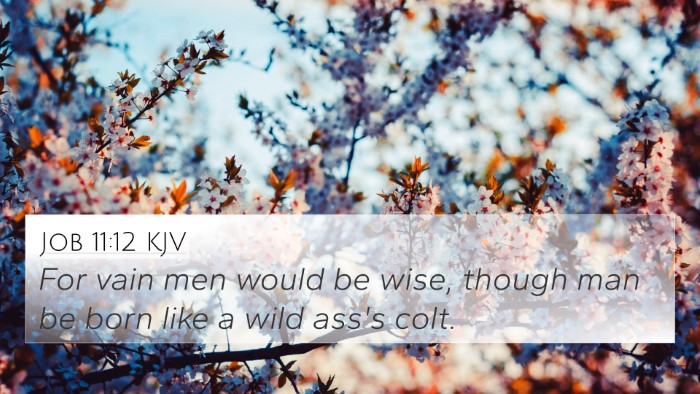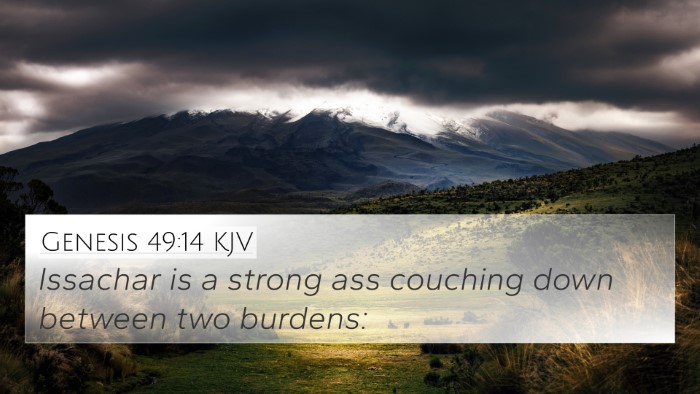Old Testament
Genesis Exodus Leviticus Numbers Deuteronomy Joshua Judges Ruth 1 Samuel 2 Samuel 1 Kings 2 Kings 1 Chronicles 2 Chronicles Ezra Nehemiah Esther Job Psalms Proverbs Ecclesiastes Song of Solomon Isaiah Jeremiah Lamentations Ezekiel Daniel Hosea Joel Amos Obadiah Jonah Micah Nahum Habakkuk Zephaniah Haggai Zechariah MalachiJob 39:5 Similar Verses
Job 39:5 Cross References
Who hath sent out the wild ass free? or who hath loosed the bands of the wild ass?
Uncover the Rich Themes and Topics of This Bible Verse
Listed below are the Bible themes associated with Job 39:5. We invite you to explore each theme to gain deeper insights into the Scriptures.
Job 39:5 Cross Reference Verses
This section features a detailed cross-reference designed to enrich your understanding of the Scriptures. Below, you will find carefully selected verses that echo the themes and teachings related to Job 39:5 KJV. Click on any image to explore detailed analyses of related Bible verses and uncover deeper theological insights.
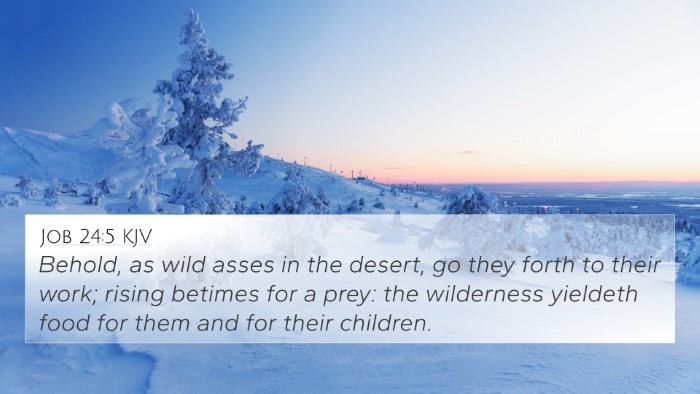
Job 24:5 (KJV) »
Behold, as wild asses in the desert, go they forth to their work; rising betimes for a prey: the wilderness yieldeth food for them and for their children.
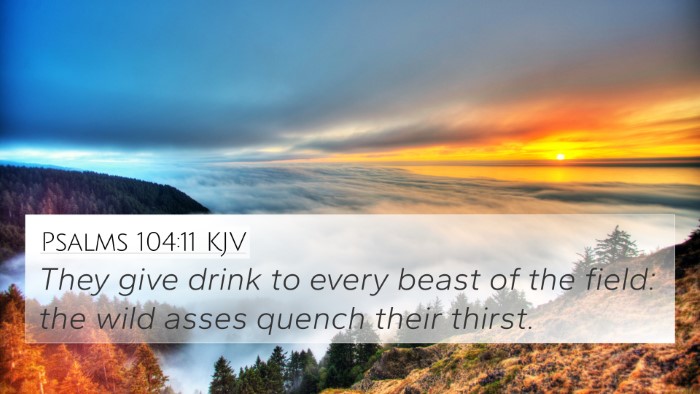
Psalms 104:11 (KJV) »
They give drink to every beast of the field: the wild asses quench their thirst.
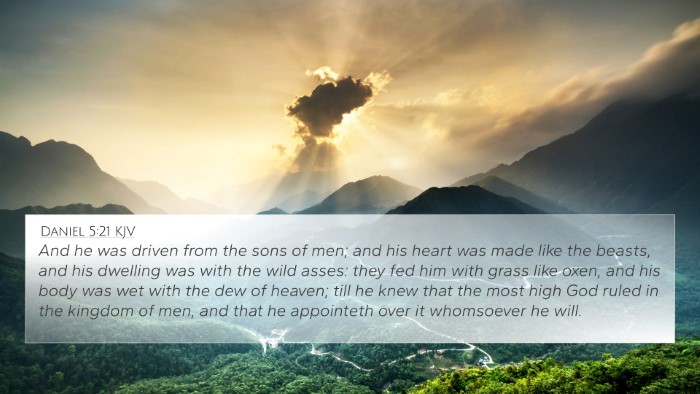
Daniel 5:21 (KJV) »
And he was driven from the sons of men; and his heart was made like the beasts, and his dwelling was with the wild asses: they fed him with grass like oxen, and his body was wet with the dew of heaven; till he knew that the most high God ruled in the kingdom of men, and that he appointeth over it whomsoever he will.
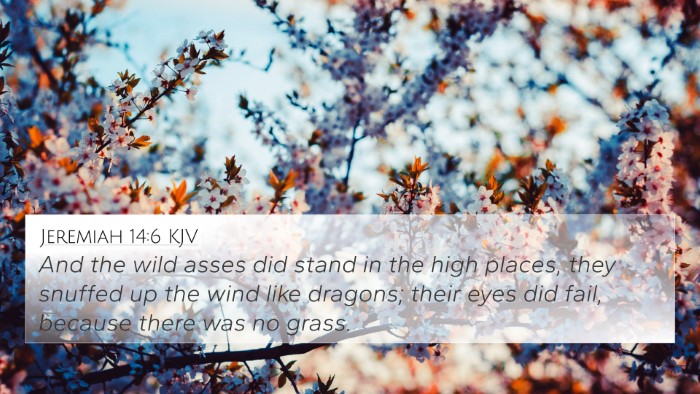
Jeremiah 14:6 (KJV) »
And the wild asses did stand in the high places, they snuffed up the wind like dragons; their eyes did fail, because there was no grass.
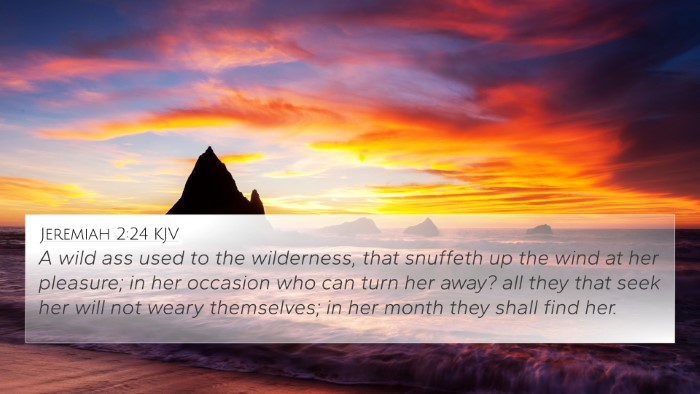
Jeremiah 2:24 (KJV) »
A wild ass used to the wilderness, that snuffeth up the wind at her pleasure; in her occasion who can turn her away? all they that seek her will not weary themselves; in her month they shall find her.
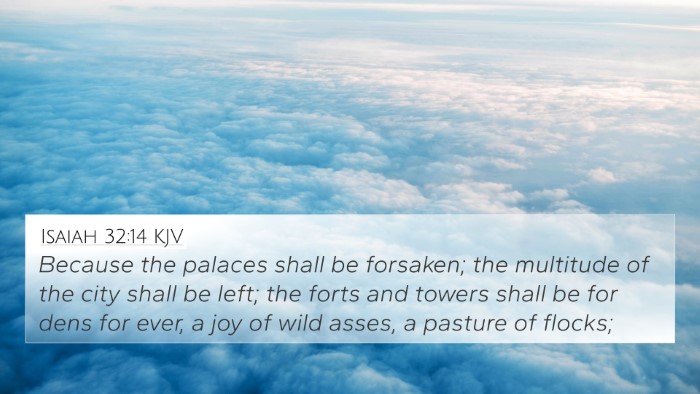
Isaiah 32:14 (KJV) »
Because the palaces shall be forsaken; the multitude of the city shall be left; the forts and towers shall be for dens for ever, a joy of wild asses, a pasture of flocks;
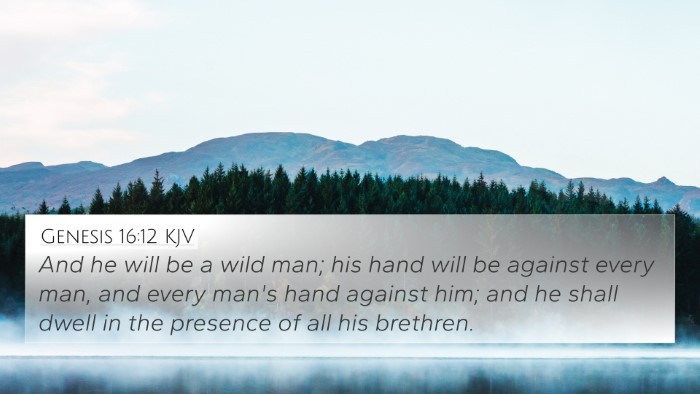
Genesis 16:12 (KJV) »
And he will be a wild man; his hand will be against every man, and every man's hand against him; and he shall dwell in the presence of all his brethren.
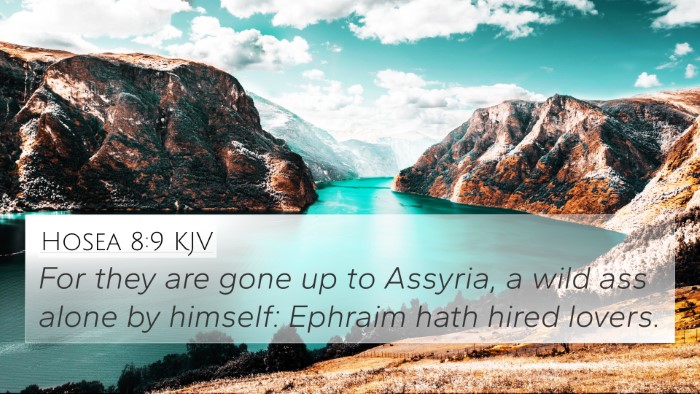
Hosea 8:9 (KJV) »
For they are gone up to Assyria, a wild ass alone by himself: Ephraim hath hired lovers.
Job 39:5 Verse Analysis and Similar Verses
Understanding Job 39:5
Job 39:5 states, "Who set the wild donkey free? Who untied its ropes?" This verse poses a rhetorical question that draws attention to the wild donkey's untamed nature and its freedom, showcasing God's sovereignty in creation.
Verse Meaning and Context
This verse occurs in a section where God speaks to Job about the wonders of creation. The imagery of the wild donkey highlights themes of freedom and divine orchestration in the natural world.
Commentary Insights
-
Matthew Henry:
Henry notes that the wild donkey represents creatures that live in desolate places, signifying a life unrestrained by human control. This points to God's ability to govern all of creation, including the untamed beasts that flourish away from civilization.
-
Albert Barnes:
Barnes emphasizes the wild donkey's independence and strength. Unlike other domesticated animals, the donkey thrives in its natural habitat, which reflects God's design for creatures to inhabit their environments freely and fulfill their natural instincts without human intervention.
-
Adam Clarke:
Clarke points out the donkey's unique traits, such as its capacity to survive in harsh conditions, shedding light on the Creator's wisdom. The passage illustrates the idea that creation exists according to God's purposes, without the need for human management.
Thematic Connections
The freedom of the wild donkey connects to broader biblical themes of liberation, nature's independence, and God's authority over creation. This can be related to various other scriptures, enhancing our understanding of God's handiwork in the animal kingdom and beyond.
Bible Verse Cross-References
- Job 11:7-9: Refers to the unsearchable nature of God’s wisdom.
- Psalm 104:25-26: Describes the greatness of God's creation, including wild creatures.
- Proverbs 30:29-31: Discusses the majestic creation of animals.
- Isaiah 43:20: Speaks of God providing for wild animals.
- Matthew 6:26: Jesus mentions how God cares for the birds of the air, indicating His attention to all creatures.
- Psalm 147:9: Notes that God gives food to the wild animals, reinforcing His provision.
- Lamentations 3:34-36: Addresses God's justice in dealing with creation.
Connections Between Bible Verses
The inquiry about who liberated the wild donkey invokes questions about God's governance over creation. Other passages that resonate with this theme include:
- Genesis 1:24-25: God's creation of living creatures according to their kinds.
- Job 12:7-10: The natural world as a teacher about God's ways.
- Romans 8:19-21: The creation eagerly waiting for liberation, echoing the theme of freedom.
Comparative Bible Verse Analysis
Conducting a comparative analysis of these verses provides insight into the nature of freedom within creation. Observing the parallels in themes related to God's sovereignty and care can enrich one's study of scripture.
Cross-Referencing Biblical Texts: A Study Approach
Utilizing tools for Bible cross-referencing, such as a Bible concordance or cross-reference Bible study guides, can deepen one's understanding of how scriptures interrelate. Engaging in cross-referencing Bible study methods can help identify thematic links effectively.
Conclusion
Job 39:5 encourages reflections on God's creation, illustrating the untamed life of the wild donkey as a metaphor for divine freedom and sovereignty. It invites readers to explore the deeper connections between various scriptures, thereby enriching their biblical knowledge and interpretation.

